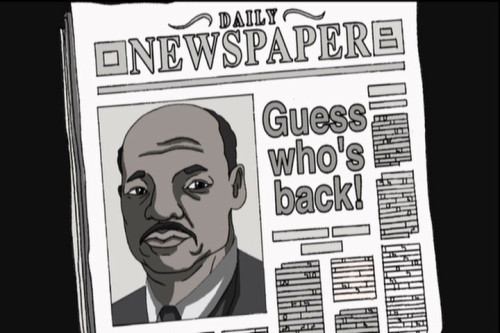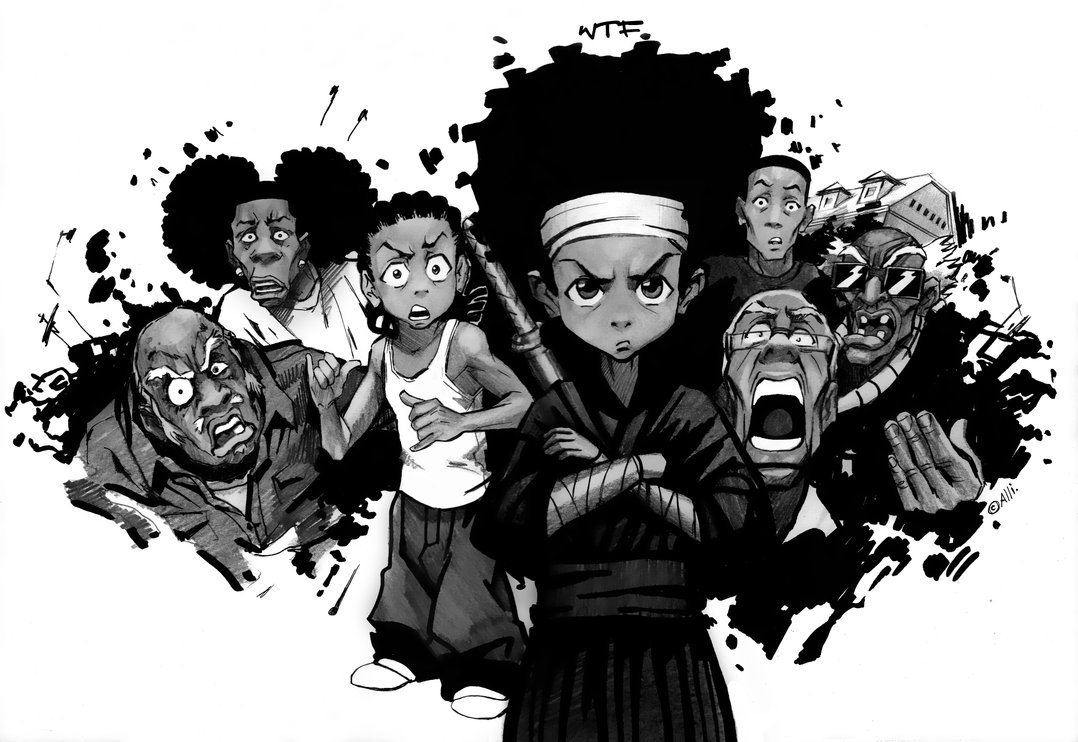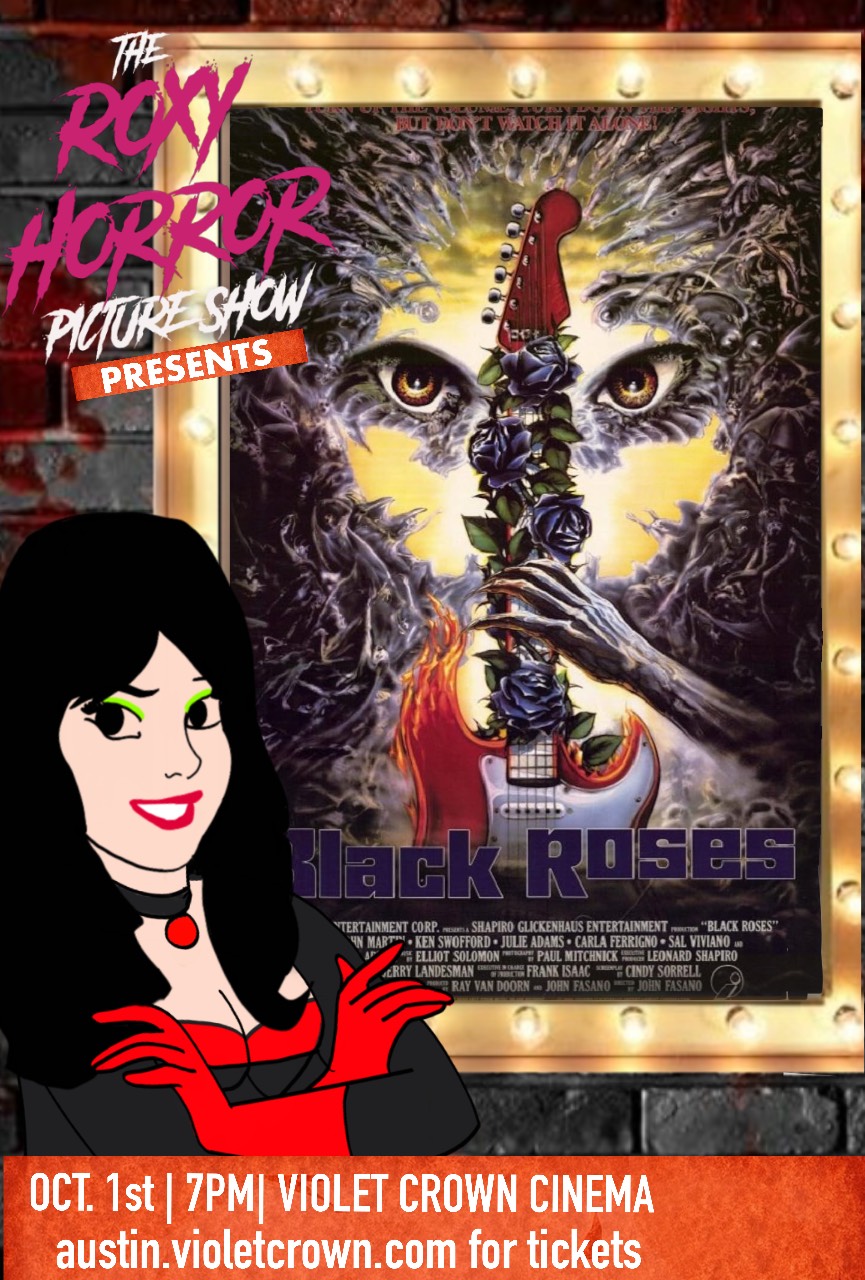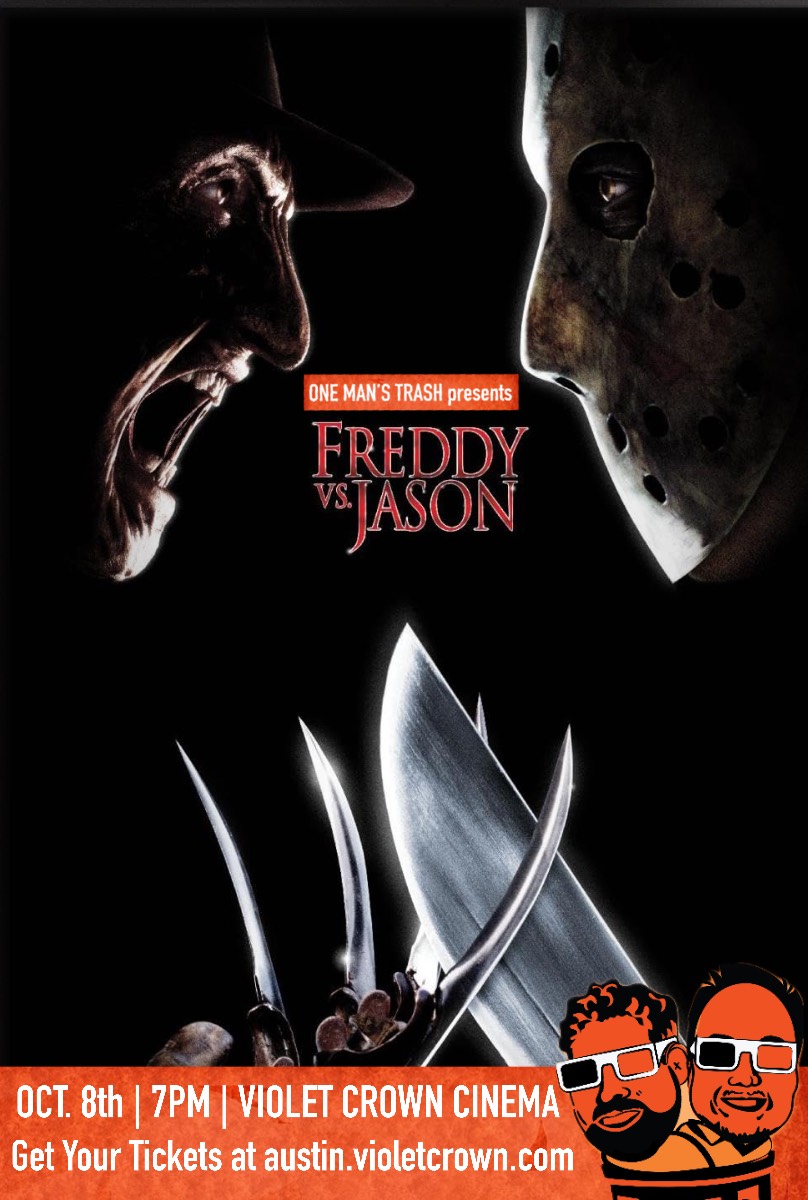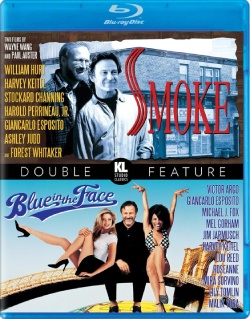The Boondocks was always a show steeped in controversy. The first episode opens with the show’s lead, a militant youth named Huey Freeman, declaring that “Jesus was black, Ronald Reagan is the devil and the government is lying about 9/11” to a garden party of rich white folks. The show only got progressively more blatant about it’s political stance from there.
From the beginning of its run on Adult Swim, the show was an outlier from the rest of the network’s programming. While shows like Aqua Teen Hunger Force, Sealab 2021 and Squidbillies went for the more surreal end of lowbrow, The Boondocks was genuinely intelligent and striking satire. So, one would figure that for the end of it’s nine year/four season run, this unique animated series would go out with a bang of a final season that squired modern cultural issues of race, media representation and the celebration of ignorance with a firm but funny hand, right?
No. That. Didn’t. Happen.
Season 4 of The Boondocks is, for my money, one of the worst examples of how horribly a show can degrade without the guiding light of its original creator. Said creator is Aaron MacGruder, a Chicago born cartoonist who initially created The Boondocks as a syndicated comic strip in 1996. I haven’t read that much of the strip myself, but from what I have seen, it’s clear that McGruder’s comic had a strong political edge in the same fashion as the early years of Doonesbury. The strip initially made it’s huge wave of controversy in the weeks following 9/11, with a series installments involving Huey calling the CIA terrorist hotline to expose the truth about the United States’ funding of terrorists during the Regan-HW Bush administration. McGruder took risks that made his strip controversial, but also gained him the respect and adoration of millions.
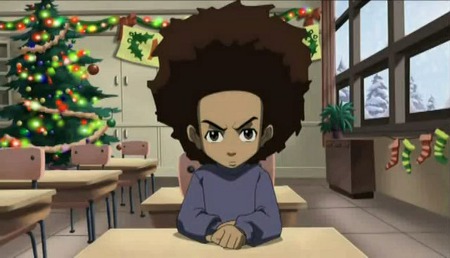
That sort of edge was clearly present in the television adaptation from its start in 2005. During its first season, The Boondocks covered every satirical topic it could muster: the post-9/11 fear mongering, the willingness of people to forgive celebrities for heinous crimes they obviously committed, the horrible diets of the average American, etc. At the same time, some episodes were simply very heightened comedic hijinks that served to give the characters room to grow, sprinkled with moments of satiric jabs and well choreographed action scenes.
All of those characters had humorous yet eloquent points to them: Huey was the straight man with bold convictions; Riley was the wannabe thug that served as a representation for the ignorance of youth; Granddad was the silly elder that commented on the dishonesty of the older generations; Tom Dubois was the bland suburbanite who had a lack of cultural roots; Uncle Ruckus was the total Uncle Tom who speaks on behalf of the blind trust of those in power; the list goes on. Yet, what always consistently rang true was it’s desire to go after the hypocrisy of the ignorant, no matter what their racial background was. That would only continue during Seasons 2 & 3, which took on the fervor of the 2008 election, the lack of action from FEMA post Hurricane Katrina and (in episodes that never aired in the United States) the negative cultural impact of BET.
Then… there’s the fourth and (supposedly/hopefully) final season. Gone is Aaron McGruder and with him the biting satire that made the show as exciting & entertaining as it was highly controversial. Instead, we have a collection of episodes that, at best, feel like solid premises that didn’t go much further than the early outlining stages and at worst feel like retreads of earlier much better episodes during the show’s height. The most egregious example of the latter would be Stinkmeaner: Begun the Clone War Has, which starts with the titular recurring antagonist looking directly into the camera and saying “Welcome to ‘The Nigga Moment Reboot.’ We’re gonna do some shit we already did and just pretend you didn’t see that shit the first time. That’s right nigga, we don’t respect your intelligence.”
Now, out of context, one may think that this is a clever parody of Hollywood’s need to remake popular properties by using the fan favorite topics of the show like Stinkmeaner and “The Nigga Moment.” However, the rest of the episode plays out like a blatant beat-for-beat rip off of the original Stinkmeaner episode, without any real twist on the formula. Merely pointing out your laziness isn’t the same as reflecting upon the laziness of an industry that recycles everything, Boondocks writing staff minus McGruder. Go watch 22 Jump Street and learn a thing or two about satire of that fashion.

That laziness is really what haunts this season. Episodes so often meander without much of a plot and go for the most shiftless jokes possible, rather than the complex weaving of humor and righteous satire that made the show so critically praised. Most of the targets for season 4 are ones worth taking shots at, but the shots have no bite to them. One of the worst examples of wasted potential this past season is the Granddad Dates a Kardashian episode. Instead of thinking of a new route from which to jab at a familiar target-much like the show did countless times in it’s earlier years-the episode takes no risks, making the same giant ass jokes and opportunist reality show star jokes we’ve seen in something as one note as an Aaron Seltzer/Jason Friedberg production. The same goes for the Breaking Granddad episode’s lampooning of Breaking Bad & the African American hair product industry and the Freedomland episode’s attempted commentary on the degradation of the middle class & the poor treatment of workers being compared to slavery. It all just doesn’t coalesce into anything thought provoking or even the least bit entertaining. It’s just… boring.
The satire isn’t the only element that’s suffered, though. Huey Freeman no longer crusades for real change in society with a militant attitude and a pension for martial arts, instead just standing by and sighing as ignorance happens around him. The same sidelined nature goes for Riley, Tom and many of the other popular characters on the show. Granddad has most of the focus in season 4’s episodes, but his once funny antics that displayed the naive foolishness on the elderly end up being poorly plotted acts of asinine behavior. And don’t even get me started on how much they’ve misused Uncle Ruckus, whose racism has become less about laughing at the ludicrous chauvinism of a bigot and more about simply shouting slurs.
All of these formerly entertaining characters have become empty one-note shells of what they once were, being mere dispensers for flavorless jokes rather than exaggerated caricatures for modern society that were still capable of real moments of humanity. Even when they were at their lowest depths of decency during the Aaron McGruder years, Granddad, Riley and Huey all still had these occasional moments of genuine sympathy, whether it be the mural reveal in Riley Waz Here, Huey’s crisis of faith at the end of The Passion of the Ruckus or the brief comforting moment between Huey and Grandad at the end of The Hunger Strike. Hell, even the action this season was poorly implemented, with each fight having no real weight on a story, satiric or even comedic level.
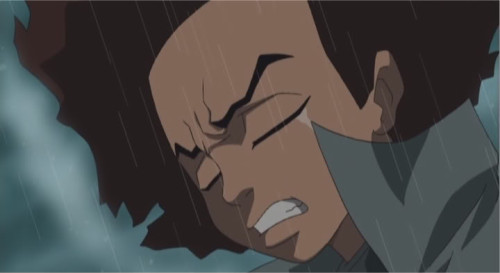
Ultimately, the reason all of this hurts as much as it does is because The Boondocks was such an important show to me. As a white kid raised in the suburbs, I had a rather sheltered upbringing. I didn’t think about much else beyond the bubble of my neighborhood. Then, I saw The Boondocks‘ first season as it aired in 2005. As a thirteen year old, it shook my perceptions of what animation could do, what it could say and how it could make me think. I’d still cite The Return of the King episode as one of the most important half hours in television history, managing to mix the show’s silliest jokes with hard hitting satiric arguments on the state of mainstream African American culture up to that point and how a civil rights leader like Martin Luther King Jr. would react to it upon seeing it first hand. Hell, I love it so much that I still watch it annually on MLK Day. That episode and many others like it made me question the world around me and opened my eyes to perspectives I’d never thought of before. It wasn’t just that the show entertained me; it helped change me into a more culturally aware person.
So, naturally, watching season 4 felt like a stab in the gut. The show that was once known for taking risks and being an unique voice has been sullied into one of the blandest and least funny shows on television in recent memory. The fourth season feels like a show that the Aaron McGruder era would have mercilessly called out back in the day; a lazy, hypocritical and comedically trite mess that claimed to be fighting against stereotypes it ended up promoting. Yet, I can still say that through re-watching the earlier seasons as research for this article, they still really do hold up. Even if the topics they cover are slightly dated, the show’s first three season have this energy and thought provoking bite that still works tremendously.
Sure, not every episode is a solid hit; some of season 3’s episodes rely on being a bit too one note with its characters (i.e. The Story of Jimmy Rebel). Yet, most of the wit and righteousness indignation that Aaron McGruder and his staff put into those initial years of the show still shines through in even the worst of those episodes and many of those characters will remain some of my favorite animated ones of all time. Hopefully that same wonderful mix can come through in McGruder’s new Adult Swim show, Black Jesus. And maybe – just maybe – we’ll get to see a spark of what a fitting final season for The Boondocks would have been through that show.
